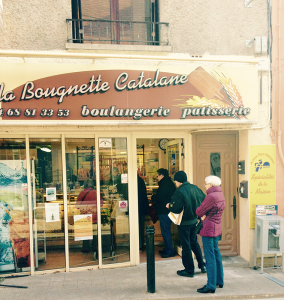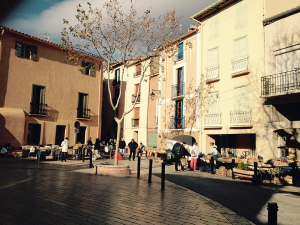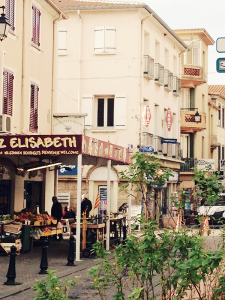Learn French … by Shopping
By Michele Reed
michele@cny55.com
Photos by Bill Reed

When we retired and began our French adventure, one of the first things friends and family in Central New York would ask us was, “Do you speak French?”
Our honest answer at the time was always a simple “No.”
Now, after five years of part-time living in France, we are by no means fluent. But each year our answers to that question would progress: “We know a few words.” “Enough to get by.” “Better and better each time.”
Probably most telling has been the reaction of our French friends. Rosa, our next-door neighbor, used to introduce me with a laugh: “This is my American neighbor. She speaks NO French and I don’t understand English.” Now we have conversations about the weather, our families, local happenings.
Gilles, our neighbor across the street, with whom we used to communicate with gestures and smiles, accorded us one of the highest compliments on our return this time. “Your French is getting much better!” he told us with two thumbs up. He and Bill talk about the jazz and blues they both love.
When we were unable to return for the winter, even though we had told them to expect us in January, we took a big step in our road to learning French. We wrote our neighbors a letter — in French. To our great surprise and happiness, an envelope came in the return mail about two weeks later. A Happy New Year card, with a description of the winter weather there from Gilles and greetings from Rosa.
They say learning new languages gets harder as you age. We can attest to that! Certainly it is more difficult in our 60s than it was when we took high school Spanish and German. So how are we able to progress with just part-time residence in France?
We started in Central New York to prepare ourselves. Bill has amassed a 1,000-day-plus perfect record in the free language-learning app Duolingo. In 10 minutes a day, he gets vocabulary, grammar and pronunciation practice — all before breakfast.
I’m a fan of the website Comme Une Francaise (Like a French Girl) — but it’s for guys, too. You can get free videos once a week, direct to your inbox, covering topics like how to talk about sports, shop the farmer’s market and eat out.
Many more websites and apps are available, too.
But more than anything, living in France has taught us much. Those high school teachers knew what they were doing with immersion trips and foreign-exchange programs. There’s nothing like living somewhere to improve your language skills day by day.
We came up with a few tips to help fellow seniors pick up a new language in a foreign land or here at home.

Watch local TV. When in France, we watch only French TV. The French news gives us a new Eurocentric understanding of current affairs. House-hunting shows, cooking competitions and geographic specials teach us vocabulary and pronunciation. Plus, they expose us to accents that are different from our Southern French one.
In the States, you can easily download an app for France 24 and other foreign news channels. Some cable companies have packages to buy channels in other languages.
Embrace the local culture. French cinema is among the best in the world, and they are proud of it. So there’s plenty of language practice to be had watching old black and white classics, comedies from the ’40s and ’50s, and even cartoons like Asterix the Gaul and Tintin. I love the old French cabaret songs. The repetition of words and careful diction help in remembering phrases. At the bouquin (boo – kan) fair, we pick up used books on local history and tall tales. Children’s books are especially good when you’re just starting out in a language.
Thanks to YouTube, you can find at least snippets of old movies, cartoons and songs in foreign languages.
Learn about the land. The French love their heritage, and knowing about French history and geography is a mark of a cultured person. So here TV specials abound, providing ample language practice while learning about everything from Charlemagne to Charles de Gaulle, and French geography from Paris to Nice. Books, magazines and tourism pamphlets help us learn about the different regions of France.
At home, reading travel books, histories or memoirs about the country you’re interested in will give you helpful knowledge of history, customs and culture.
Read the local newspapers. “Le journal,” or the newspaper, is another great language learning tool. We buy Midi Libre, our local paper, every day and in addition to keeping up with the news, we’re always strengthening our language skills, even from the horoscope, weather forecast, cartoons and games.
You can find an online presence for newspapers in countries all over the world. Our own Midi Libre has an app, and we use it to keep up on the French “local” news when we are in Oswego.

Go shopping. This is our biggest and best tip, one dear to my heart.
When you live in another country, you can’t just eat out at restaurants all the time. You have to shop for bread, meat, vegetables, and even such mundane things as toilet paper and soap. To get what you need requires a daily influx of new vocabulary.
The words for some things look and sound the same in either language. At the farmers market, it’s easy to know what celeri and tomate are, but courgette (zucchini), champignon (mushroom) and ail (garlic) take a little learning.
And you can’t just ask for or worse yet point at or pick up what you want. Every transaction helps with learning the language and its subtleties. When you visit a shop often, you develop a relationship with the shopkeeper or clerk, and often they are happy to help you practice the language.
Science tells us that exercising our brain by learning new things is a great way to keep it sharp as we age.
Learning a new language after 55 might not be the easiest thing to do, but with a little creativity and persistence, it can be done. It won’t just exercise your mind, it’ll expand your world.

